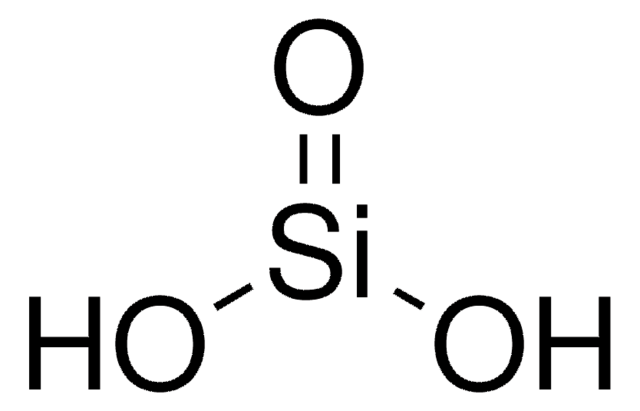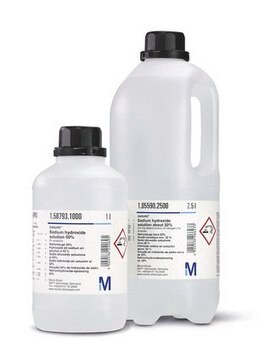About This Item
Número CAS:
Número CE:
Número MDL:
Código UNSPSC:
12352301
ID de substância PubChem:
NACRES:
NA.21
Produtos recomendados
Formulário
powder
perda
<16% loss on ignition
tamanho de partícula
−80 mesh
cadeia de caracteres SMILES
O[Si](O)=O
InChI
1S/H2O3Si/c1-4(2)3/h1-2H
chave InChI
IJKVHSBPTUYDLN-UHFFFAOYSA-N
Procurando produtos similares? Visita Guia de comparação de produtos
Aplicação
Silicic acid is a hydrophilic inorganic material that can be used as a zirconium phosphate additive to enhance proton conductivity in the inorganic-organic composite membranes. It can also be used as a binder for the electrodes of thermal batteries.
Código de classe de armazenamento
11 - Combustible Solids
Classe de risco de água (WGK)
WGK 3
Ponto de fulgor (°F)
Not applicable
Ponto de fulgor (°C)
Not applicable
Escolha uma das versões mais recentes:
Já possui este produto?
Encontre a documentação dos produtos que você adquiriu recentemente na biblioteca de documentos.
Os clientes também visualizaram
Silicic acid polymerization catalyzed by amines and polyamines.
Mizutani T, et al.
Bulletin of the Chemical Society of Japan, 71(8), 2017-2022 (1998)
The Intimate Role of Imidazole in the Stabilization of Silicic Acid by a pH-Responsive, Histidine-Grafted Polyampholyte.
Demadis KD, et al.
Chemistry of Materials, 27(19), 6827-6836 (2015)
T I Nikoforova
Voprosy kurortologii, fizioterapii, i lechebnoi fizicheskoi kultury, (3)(3), 16-21 (2013-07-04)
This article is focused on the benefits of drug-free therapeutic technologies, such as the use of artificial general siliceous baths for the treatment of patients with arterial hypertension. This approach results in the anti-hypertensive effect simultaneous with the correction of
Li-Na Niu et al.
FASEB journal : official publication of the Federation of American Societies for Experimental Biology, 26(11), 4517-4529 (2012-08-04)
Traditional bone regeneration strategies relied on supplementation of biomaterials constructs with stem or progenitor cells or growth factors. By contrast, cell homing strategies employ chemokines to mobilize stem or progenitor cells from host bone marrow and tissue niches to injured
Tsuyoshi Yamamoto et al.
Journal of plant research, 125(6), 771-779 (2012-04-25)
Rice (Oryza sativa L.) is a typical Si-accumulating plant and is able to accumulate Si up to >10 % of shoot dry weight. The cell wall has been reported to become thicker under Si-deficient condition. To clarify the relationship between Si
Nossa equipe de cientistas tem experiência em todas as áreas de pesquisa, incluindo Life Sciences, ciência de materiais, síntese química, cromatografia, química analítica e muitas outras.
Entre em contato com a assistência técnica









